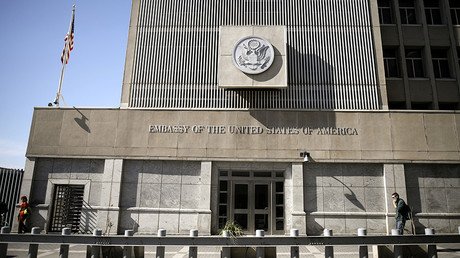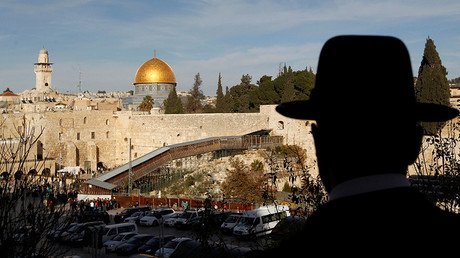Trump’s Jerusalem decision: Ignorance & political risk or ‘business opportunity’?
Donald Trump’s irresponsible decision to recognize Jerusalem as the capital of Israel is an “example of extraordinary ignorance” which could lead to explosive consequences in the Middle East, regional commentators have told RT.
On Wednesday, Trump officially announced his decision to recognize Jerusalem as the capital of Israel, claiming that such a move along with the relocation of US embassy could help resolve the Israeli-Palestinian conflict. The decision by the US leader was made despite unanimous warnings by US foes and allies worldwide, who cautioned of possible chaos erupting throughout the Middle East.
Jerusalem is one of the key issues in any Israeli-Palestinian peace negotiations. Israel and Palestine both want the historic religious cradle as their capital. The United Nations considers East Jerusalem to be occupied Palestinian territory, but hopes Jerusalem can one day serve as the capital of two states, Israel and Palestine. Tel Aviv, however, refuses to share custody of the Holy City which it annexed in 1967.
Considering the social, political and economic upheaval surrounding Trump’s decision, experts who shared their views with RT, are united in their assessment that the US administration’s move is, instead, a step away from any long-lasting peace in the Middle East.
“I don't think Trump is really that interested in peace. I think he is more interested in causing a crisis in the region because that is one of the ways he manipulates media through constantly finding subjects to form the basis of this constant, almost hourly twitter fest, which the US media feast on,” Martin Jay, an award-winning British journalist now based in Beirut, told RT.
“It will be very difficult to get a peace deal in the Middle East from now on, because there will be a lot of social movements in all the Islamic countries, including Turkey. This decision will have much greater implications in a global sense than the American president Donald Trump probably assumes,” Huseyin Bagci, professor of international relations at Ankara’s Middle East Technical University, told RT.
“If Trump was really serious about peace, he would be telling the Israelis to leave occupied East Jerusalem, the rest of the occupied Palestinian land, and making peace with the Palestinians,” said Kamel Hawwash from the Palestine Solidarity Campaign.
Hawwash, who himself is from Jerusalem, said Trump’s decision would be etched in Palestinian history as ‘Black Wednesday’ – the day the US “handed Jerusalem to Israel on a plate.” The “irresponsible” and “illegal” decision will only bring more violence, Hawwash warned, echoing the general anticipation of wider consequences.
“It will make the pursuit of peace more difficult. It was really quite laughable that Donald Trump said what he said about recognizing Jerusalem as Israel’s capital. And then said this would aid peace somehow, but he did not tell us how. If it is to aid peace, why is it that the US State Department has been warning the embassies to take care about the reaction? If it was such a good move, then it would have been received well by everyone. But in fact, almost every country around the world has condemned the decision,” Hawwash said.
READ MORE: Trump’s Jerusalem recognition - fears of global backlash
“America and American citizens will not have a very easy life from now on in the Middle East and many other parts of the world,” Bagci told RT. “America will be considered, this is my expectation, as an enemy, direct enemy. Most of the Islamic countries, population, in particular, will consider America as the enemy, and it will have a lot of psychological problems for the Muslims in America, for the Muslims outside of America.”
Trump’s decision will also have a direct impact on Washington’s relationship with key players in the region, after the US president “turned his back” on their interests, Jay believes.
“He has a total lack of respect not only for the big regional players who can make that peace process happen, but also for the apparatus in Washington,” Jay said. “This is really a guy who has gone off the scale and literally swallowed the Israeli press release verbatim… It may well be that this is just another example of extraordinary ignorance on the part of Trump.”
“With this American decision, Turkish-American relations will enter into a very big crisis. My expectation is that between Donald Trump and Turkish President Erdogan, there will be no good friendship anymore,” Bagci added.
Some, meanwhile, argued that Trump’s decision could be partially driven by his business instincts to further increase US arms sales in the region.
“Trump wants to continue to create a crisis, the bigger the crisis the better, because we've seen the increase of arms sales, we've seen Lockheed Martin shares go through the roof. It is really about creating tension in the region and cleaning up on arms deals, the F16s, to all the neighboring states,” Jay pointed out.
“America has one advantage at the moment. They control the entire Middle East capital; they control the entire military structure,” Bagci noted. “He is a businessman, he is a risk taker, and I think he has taken the risk this time, not a business risk, but political risk, and I think the Middle East will be in turmoil.”
Observers also noted Trump’s apparent willingness to dance to the Israeli tune, which they believe further discredits the US leader in the Muslim world.
“Trump seems to be showing the supreme and ultimate, almost blinded dogma of respect, reverence to the Israelis and something bordering along the lines of borderline contempt for all the big players in the region,” Jay said.
“He is surrounded by advisers who are themselves so pro-Israeli, that they fund some of the settlement enterprise themselves. So you're hardly going to get them saying, we should ask Israel to leave occupied Jerusalem,” Hawwash noted.
“And what it does do to the peace process is… It says, America can have no role in it, because, only is it not an honest broker, it is a pro-Israeli government and pro right-wing Israeli government that has no interest in peace but in an expansion,” he added.
“The US has never been a mediator or an honest broker and now has made that plain,” agreed Ali Abunimah, the founder of the pro-Palestinian website Electronic Intifada. “The reason that we're here is that for so many decades the so-called international community has abdicated its responsibility towards the Palestinian people to the United States based on the fiction that the United States is somehow an honest broker when the reality that has been plain for all to see, is that the United States is basically Israel’s main agent, arms supplier, and financier.”
While the international community only voices never-ending concerns, but then refuses to take direct steps against Israel for its occupation of Palestinian lands, Abunimah called on civil society groups to act. “Nobody can continue to hide between the fake peace process and fake talk about a two-state solution. If they are really concerned about the situation, it is time for action, it is time for sanctions,” the activist said.

















